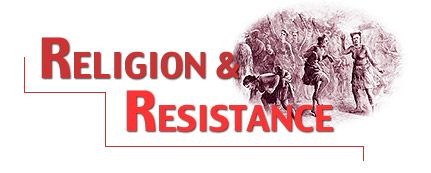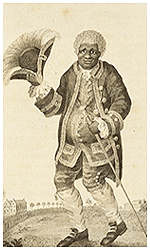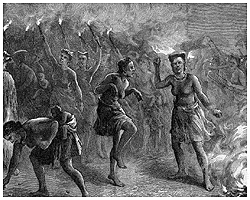 |

 |
The
practice of harnessing supernatural forces and spirits for one’s own
personal use, known in some parts of Africa as ‘Obeye’ (an entity that
lives within witches), has taken on many names in the Caribbean islands,
such as Shango (Trinidad), Santeria (Cuba), Vodun or Voodoo (Haiti),
Ju-Ju (Bahamas), Obeah (Jamaica),. Although African slaves usually
practiced Obeah for "evil" or rather self-interested, instrumental
purposes, this faith also aided them as a source of strength and
clandestine resistance. The practice of Obeah is the belief that one can
use certain spirits or supernatural agents to work harm to the living,
or to call them off from such mischief. Generally, the British used the
term Obeah to describe all slave acts and practices that were considered
supernatural or evil in nature, such as rituals and fetishes.
 Modern
historians believe that Obeah originated from the Ashanti and
Koromantin tribes of Africa on the Gold Coast, and that imported slaves
introduced it to the Caribbean as early as the mid 17th century.
Regardless of its use, for ‘evil’ or ‘good’, the Obeah men were treated
with the utmost respect and fear by all whom met him. The Obeah man and
women played a prominent role in the Caribbean slave societies from the
beginning of the slave trade. They functioned as community leaders and
teachers of the African folk’s cultural heritage. Many Africans believed
that the Obeah man had within his power the ability to render someone
invincible, resuscitate the dead, cure all diseases, protect a man from
the consequences of his crimes, and cause great harm to anyone he
wished. Yet the Obeah man’s most powerful gift was not his ability to
steal people’s shadows , as the act of obeah or "hexing" was described,
but his intricate knowledge of herbs and poisons. The term Obeah also
suggested the word "poison" in the Caribbean plantations, this being the
preferred and most effective tool that this practitioner of "magic" had
at his disposal. Through the use of herbs and medicine, the Obeah man,
was able to "miraculously" cure or poison (obeah) a person to death.
Considering the development and practices (bloodletting) of "modern"
European medicine at the time, an ill person had a much greater chance
of survival by seeking out an Obeah man rather than a white physician. Modern
historians believe that Obeah originated from the Ashanti and
Koromantin tribes of Africa on the Gold Coast, and that imported slaves
introduced it to the Caribbean as early as the mid 17th century.
Regardless of its use, for ‘evil’ or ‘good’, the Obeah men were treated
with the utmost respect and fear by all whom met him. The Obeah man and
women played a prominent role in the Caribbean slave societies from the
beginning of the slave trade. They functioned as community leaders and
teachers of the African folk’s cultural heritage. Many Africans believed
that the Obeah man had within his power the ability to render someone
invincible, resuscitate the dead, cure all diseases, protect a man from
the consequences of his crimes, and cause great harm to anyone he
wished. Yet the Obeah man’s most powerful gift was not his ability to
steal people’s shadows , as the act of obeah or "hexing" was described,
but his intricate knowledge of herbs and poisons. The term Obeah also
suggested the word "poison" in the Caribbean plantations, this being the
preferred and most effective tool that this practitioner of "magic" had
at his disposal. Through the use of herbs and medicine, the Obeah man,
was able to "miraculously" cure or poison (obeah) a person to death.
Considering the development and practices (bloodletting) of "modern"
European medicine at the time, an ill person had a much greater chance
of survival by seeking out an Obeah man rather than a white physician.
Obeah was not only used as a source of power through its
association with the supernatural but with political power as well,
specifically slave rebellions and the other forms of resistance in
Jamaica. The Obeah man played a role as an inspirational leader who
could entice his entourage, which might number in the thousands, to
partake in resistance and rebellions. Because of their relation with
"evil," Obeah men were blamed for every mishap that fell upon a
plantation or individual. So how did they manage to recruit so many
followers? The lure of becoming the follower of an Obeah man was that
once initiated into his or her group you would become invulnerable to
the white man and his weapons. Although you might appear slain, the
Obeah man could, at his pleasure, restore the fallen body to life.

Obeah men played a central role in the conception and
development of any serious attempt at rebellion. The Obeah man provided
an "ideological rallying point" in sanctioning an open rebellion. He
afforded a meeting place for leaders and followers so they could plan
their revolts under the guise of religious gatherings, and he maintained
the link between traditional African culture which opposed colonial
rule and the Creole (Caribbean born) slaves. By far the most important
contribution that the Obeah man made to the resistance of the slave
system was his direct participation in the preparation of the
insurrectionists for war. The Obeah man would first administer an oath
to African rebels that would bind them to never reveal to anyone the
identity of the insurgents or the plans of the rebellion; to do so would
bring upon the individual an agonizing death. A white Jamaican planter,
Edward Long, best describes the ritual that the Obeah man initiated in
order to administer the oaths:
"Their priests,
or obeiah-man, are their chief oracles in all weighty affairs, whether
of peace, war, or the pursuit of revenge. When assembled for the
purposes of conspiracy, the obeiah-man, after various ceremonies, draws a
little blood from every one present; this is mixed in a bowl with
gunpowder and grave dirt; the fetish or oath is administered by which
they solemnly pledge themselves to inviolable secrecy, fidelity to their
chiefs, and to wage perpetual war against their enemies; as a
ratification of their sincerity, each person takes a cup of the mixture,
and this finishes the solemn rite. Few or none of them have ever been
known to violate this oath, or to desist from the full execution of it,
even although several years may intervene."
The
Obeah man also created a powder that supposedly possessed magical
properties that would bestow upon the user of it protection from the
white man’s weapons. Long gives a detailed account of the capture of an
Obeah man who was known to have administered many of these rituals in
Jamaica:
"In St. Mary’s parish a check was
fortunately given at one estate, by surprising a famous Obeah-man and
priest, much respected among his countrymen. He was an old Coromantin,
who, with others of his profession, had been a chief in counseling and
instigating the credulous herd, to whom their priests administered a
powder, which, being rubbed on their bodies, was to make them
invulnerable. They persuaded them into a belief, that their
generalissimo [general] in the woods, could not possibly be hurt by the
white men, for that he caught all the bullets fired at him in his hand,
and hurled them back with destruction to his foes."
Obviously, this type of power in the hands of a slave made many plantation owners uneasy, to say the least.

Joseph Williams describes the plantation owners’ view of the
Africans from the earliest days of legislation in Jamaica: "a serious
source of danger to the peace of the colony was recognized to be ever
present in the assemblies of slaves where the old religious tribal
dances were openly accompanied by drumming which aroused the fanaticism
of Africans to such a degree as to endanger a general uprising." Before
long it was discovered that a second cause of danger, this time a
personal one to master and slave alike, was to be traced to the secret
poisonings that were ever becoming more common. Beginning in 1684,
various laws were enacted in Jamaica as a precaution against slave
rebellion. Later, planter legislators enacted laws banning nocturnal
"gatherings" and religious practices. In 1816, a law was passed
recognizing the coupled danger present from revolt and Obeah, "if there
shall be found in the possession of any slave any poisonous drugs,
pounded glass, parrot’s beaks, dog’s teeth, alligator’s teeth, or other
materials notoriously used in the practice of Obeah or witchcraft, such
slave upon conviction, shall be liable to suffer transportation from the
island [deportation]."
The slaves in Jamaica,
according to plantation owners, were primitive and unintelligent
savages, yet they managed to resist the planter’s efforts to control and
exploit them at every opportunity. The laws of Jamaica are themselves
testaments to the efficient and meticulous planning of slaves in their
attempt to rebel against the "white man’s" institutions. It had taken
the planters more than 130 years, from the first law that recognized the
threat of rebellion (1684), until they implemented a law that
recognized the tripartite association between slave rebellion, obeah,
and poisonings. As the years passed and plantation owners began to
suspect that the increase in deaths by poisoning was attributed to
slaves, they enacted harsher legislation that ranged from mandatory
searches of the slaves domicile, "Every master or mistress or overseer
of a family in this island shall cause all slave houses to be diligently
and effectively searched once every fourteen days," to sentencing
slaves to the ultimate punishment – death. One of these particular laws
making the death penalty a mandatory punishment was enacted in the late
17th century:
"whereas slaves have of late
attempted to destroy several people, as well white as black, by
poison…the said slave or slaves, together with their accessories, as
well before as after the fact, being slaves, and convicted thereof…shall
be adjudged guilty of murder, as if the party or parties that took or
shall take the same had died; and shall be condemned to suffer death, by
hanging, burning, or such other way or means as to the said Justices
and freeholders shall seem most convenient."
Deaths by poison began to take on a form of covert rebellion amongst
those slaves who had rancor and access to their plantation owners or
overseers. Most of the slaves who wished to poison someone but lacked
the knowledge turned to the Obeah man of the region to execute the act.
These types of personal services usually required a form of
consideration. Obeah men were usually compensated for their services by
their followers in the form of "donations": food, shelter or money.
However, at times the Obeah man simply asked for the procurer’s pledge
to carry out a "favor" at a later date. By accumulating a large amount
of "favors" throughout a plantation or region the Obeah man gained
personal power and was able to execute his wishes with ease. The Obeah
man usually did not directly administer the poison to a victim; he
simply called in one of his favors under the guise that he was applying a
charm, and ordered that individual to administer whatever he asked to
the food of the ill-fated slave or overseer.
Clearly, Obeah men were important in the rousing, organization, and
execution of slave revolts and slave resistance in general. Whites
feared their power to invoke a rebellion and enslaved blacks were
petrified at the th ought
of falling victim to their magic. Even though these men had many
enemies, they were usually never betrayed by one of their own because he
was recognized as an important figure in the slave society of the time.
The Obeah man played various roles simultaneously. He was a healer and
an executioner, he was loved and feared, he was father to all and demon
to many. These men under the seemingly innocent guise of "medicine men"
came to accumulate power and respect that rivaled that of the largest
plantation owner. Even today in Jamaica children still tremble at the
thought of going to visit the Obeah man. ought
of falling victim to their magic. Even though these men had many
enemies, they were usually never betrayed by one of their own because he
was recognized as an important figure in the slave society of the time.
The Obeah man played various roles simultaneously. He was a healer and
an executioner, he was loved and feared, he was father to all and demon
to many. These men under the seemingly innocent guise of "medicine men"
came to accumulate power and respect that rivaled that of the largest
plantation owner. Even today in Jamaica children still tremble at the
thought of going to visit the Obeah man.
|
McCartney, Timothy Ph.D., Ten, Ten the Bible Ten: Obeah in the Bahamas. (Nassau, Bahamas: Timpaul Publishing, 1976 ).
Williams, Joseph J., Voodoos and Obeahs: Phases of West India Witchcraft. (New York: Dial Press, 1932).
Long, Edward, History of Jamaica (London:1774), Vol. II.
An Act for the substance, clothing, and the better regulation
and government of slaves, for enlarging the powers of the council of
protection; for preventing the improper transfer of slaves; and for
other purposes (December 19,1816); Acts of Assembly |


|









